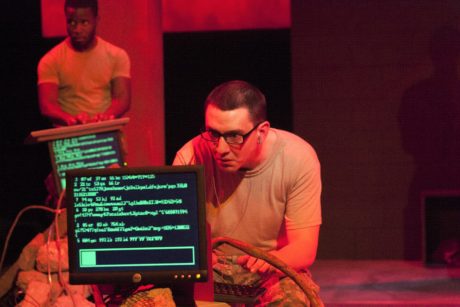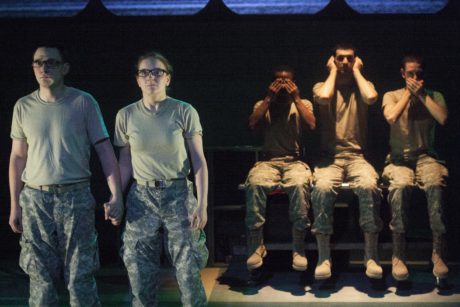Inis Nua Theatre Company has made a specialty of performing plays written in, and set in, the British Isles. So it may seem odd that Inis Nua is doing a play about Bradley Manning, the American soldier who illegally downloaded hundreds of thousands of military documents related to the Iraq War and leaked them to WikiLeaks.

But there is a connection: Manning’s mother was Welsh, and Manning spent about a few years living in Wales as a teenager. That was enough to inspire Welsh playwright Tim Price to delve into Manning’s life from Wales to Iraq and beyond. The resulting play, The Radicalisation of Bradley Manning, is an engrossing exploration of what drove Manning to commit actions alternately condemned and praised around the world. It’s a thought-provoking work, and Director Tom Reing’s stark staging is filled with marvelously theatrical touches.
Price’s play was first performed in Britain in 2013, just before Manning was convicted – and just before Manning was publicly revealed as transgender, assuming a female identity. (Now known as Chelsea Manning, she is serving a 35-year prison sentence.) Manning’s gender identity crisis is crucial to Price’s play: Manning is portrayed at different points by all six members of the cast (four men and two women), thus emphasizing different facets of Manning’s complicated personality. Often the change in actor will occur in the middle of a scene – Manning is always being played by whoever is wearing a pair of black-rimmed eyeglasses, so we frequently see one performer take off glasses while another puts on an identical pair, assuming Manning’s identity before our eyes.
Price depicts Manning as a lifelong target of bullies, constantly being maltreated (and treating others cruelly in return), and frequently on the verge of a mental breakdown. We follow young Bradley from his school days, when he was taunted for his sexuality and his effeminacy, to his late teenage years where his obstinacy and lack of social skills led to him being fired from a series of menial jobs. When he asks his verbally abusive father for money for college, his father refuses and forcefully suggests he get college money by joining the Army. “Life’s about compromises,” says his father, adding “Do you want to join the Army and be a man, or do you want to be gay and work at Starbucks?”
So, the Army it is, even though he’s small, weak, and completely unsuited for military life. Naturally, the taunting continues, with Manning ridiculed as the “runt” of the platoon. A romance with Tyler, a guy he meets at a gay rights rally, provides the only respite from a life of misery (though Manning has the keep the relationship secret, since “Don’t Ask, Don’t Tell” had not yet been repealed).
Nearly kicked out of the Army after basic training, Manning somehow endures and is deployed to Iraq, where he witnesses torture, fabrications, and mistreatment of innocent Iraqi civilians. When his superiors ignore his protests, he decides to do something about it.
Price doesn’t justify Manning’s actions, but by making Manning a sympathetic character, he does make those actions comprehensible. Occasionally, though, Price makes some curious connections.
For instance, during the school scenes, we repeatedly see Manning’s teacher educating her class about 19th century Welsh worker revolts against the British government. Price implies that learning about those revolts and the valiant men who led them (and who were imprisoned afterwards) helped to inspire Manning’s actions. But comparing riots in the 1830s by lowly-paid coal miners to releasing top secret documents on the internet is a bit of a stretch, and the correlation isn’t a persuasive one.
The Radicalisation of Bradley Manning never lets up for an instant. It’s packed with information, and Price deftly uses repetition to demonstrate how Manning’s spirit was steadily broken. We see Manning repeatedly trying to pack his duffle bag in an exercise forced on him by his sergeant; when he fails over and over, the rest of the platoon pays the price – and turns against him. Later, when he’s under suicide watch and locked in the brig at Quantico, other soldiers keep walking by his cell and asking him “Are you OK?” We spend several minutes of the play witnessing this, and the constant reinforcement lets the viewer empathize with Manning as he is being pushed to the breaking point.
Reing’s production feels like a nightmarish version of a video game that Manning, and the audience, cannot escape from. The back wall of Meghan Jones’ set is a set of cinder blocks crowned by eight television sets broadcasting combat footage (Janelle Kaufmann did the video design.). Computer monitors dot the stage, and the playing area is delimited by a chain link proscenium. Shon Causer’s lighting casts most of the stage in shadows, and Zack McKenna’s sound design wallops the audience with pounding bass (and, at one crucial moment, a well-chosen pop song). Costumer Katherine Fritz allows for quick changes by having the actors keep their army fatigues on at all times, even under more elaborate outfits.
All six performers are impressive, not just as Manning but in the way they deftly switch between characters. David Glover changes from a mystified Manning to his overbearing sergeant to a fun-loving recruit all in the space of a few minutes, while Isa St. Clair is both a trembling Manning and his demanding teacher. Trevor Fayle doubles as Manning’s father, David Pica as Manning’s lover, and Campbell O’Hare as a student and a co-worker. Johnny Smith is the most frequent of the Mannings, providing a focal point for the audience.

Playwright Price is less concerned with the Iraq War and its moral and political ramifications than the way those issues impacted Manning. You’ll learn a lot about Manning’s inner life when you see The Radicalisation of Bradley Manning, but you won’t learn much about those documents he leaked and just why they were so damaging.
Still, if you think you know Manning’s story from the headlines, you’re in for a big surprise. The Radicalisation of Bradley Manning tells an important, vital story, and tells it in an electrifying way.
Running Time: One hour and 45 minutes, with no intermission.
The Radicalisation of Bradley Manning plays through March 6, 2016 at Inis Nua Theatre Company – performing at The Louis Bluver Theatre at The Drake – 1512 Spruce Street, in Philadelphia, PA. For tickets, call the box office at (215) 454-9776, or purchase them online.





